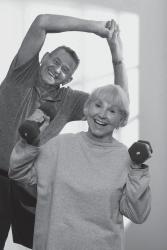 How much do your day-to-day choices determine your long-term health and well-being?
How much do your day-to-day choices determine your long-term health and well-being?
When it comes to longevity, Sophie, 95, has great genes. Most of her blood relatives have lived well past the age of 80. Now a resident of a local assisted living community, Sophie enjoys brunch, bingo, brain fitness and the occasional bourbon.
Sophie learned to drive when she was 57 years old. Before that she often walked to and from work and to do errands.
Throughout her 60s Sophie continued an active life, teaching, housekeeping, sewing, going on family camping trips and hosting neighborhood parties. Her quick, dry wit kept her smiling through many challenging times.
She worked until 65 as a second grade schoolteacher. Even after she retired to Thousand Oaks at age 87, her assisted living bus took her to the second-grade classroom where she volunteered weekly. She joined the local church, taking pleasure in the people and the message.
Sophie is an example of good genes, good choices. The combination of inherited traits and a healthy lifestyle plays an enormous role in her enjoying life at the age of 95.
Ask Sophie about her choices and she says, “I didn’t look at my lifestyle decisions as choices. I was just doing what was expected of me and what I enjoyed.”
Sophie’s daughter Cathy is now over 50 and, like many women her age, she’s faced with daily decisions that will affect her longevity and well-being. Up until this point, Cathy’s “good genes” were the most important driver of her longevity. Now Cathy’s lifestyle choices will determine her ability to live a long, healthy life.
So how is Cathy doing?
As a single woman with a demanding professional job, she balances her work schedule with morning walks with her dogs. Cathy is fortunate to be at a company that offers programs in work-life balance and an on-site gym. And she’s smart for taking advantage of these benefits.
Cathy makes good food choices. “I’ve never been a fastfood lover, so it’s easy to gravitate to the salad bar while at lunch in the company cafeteria,” she said. “I cook at home during the week, reserving weekends for dinners out with my friends.”
Cathy is a part-time caregiver for her mom, visiting her each night to help with medications, changing for bed, paying bills and preparing for the next day. Cathy is the only child who lives close to Sophie, which brings a lot of stress and responsibility.
Like most family caregivers, Cathy is at risk for health issues. Her ability to get a good night’s sleep and to take respite breaks from the stress of caregiving will help determine her long-term health situation.
So far, Cathy’s making good choices.
What about you? According to the Center for Disease Control, obesity, high blood pressure and high cholesterol, the underlying causes of most deaths in individuals over age 50, have less to do with inherited traits than with how we choose to live.
Are you worried that the bad choices you’ve made have already determined your future? There’s good news here, as studies have shown that even after years of unhealthful choices we can enhance our long-term health by improving our lifestyle.
Even a small change in diet, exercise or stress reduction can make a big difference. Cathy’s generation will live longer than any generation before them.
Living longer is only more fun when you’re healthy and enjoying life.
Taking that first step is a small change that can bring great rewards.




